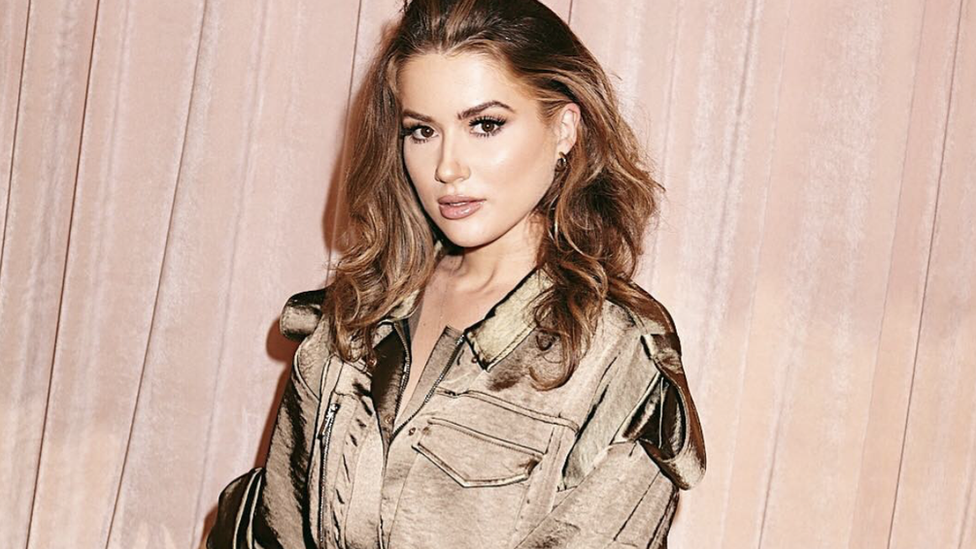The millionaire make-up mogul behind Huda Beauty
- Published
Huda Kattan is a celebrity in the make-up world, here she meets her UK fans for the first time.
How many times in life have you thought about quitting your job to do something you love instead?
Huda Kattan made that decision 10 years ago and now runs beauty empire Huda Beauty, which Forbes recently valued at over $1bn (£800m).
The American left Dubai - where she had made her home for two years - and her job in finance and headed to Los Angeles to become a make-up artist and start her own beauty blog.
It was only when she started making her own false eyelashes - because she couldn't find any she deemed suitable for her clients - that she realised there was a huge gap in the market.
'My family were disappointed at first'
"I didn't necessarily know if I belonged in the beauty industry, I always knew I had a love for it, but my family wasn't necessarily into something like beauty or fashion," Huda, whose parents were Iraqi immigrants, tells the BBC.
"They were very much into having serious jobs like a lawyer or a doctor, those were the kind of things my family wanted me to do, so it was kind of a big deal for my family.
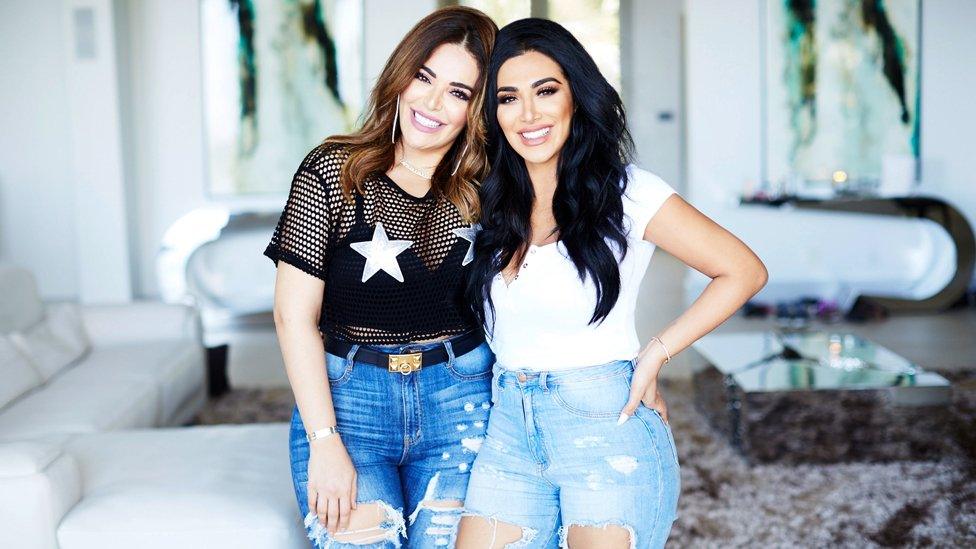
Huda and her sister Mona (left) went in to business together to launch Huda Beauty
"I felt like they were disappointed at first, so I knew that I had to prove something to be taken seriously."
When the 35-year-old started her false eyelash business in 2013, she already had a good base of potential customers - the people who read her blog and followed her on social media.
But she might never have got the business off the ground if it wasn't for her sister, Mona, who is now Huda Beauty's global president.
"I was adamant about Huda starting a lash brand, because at the time I was doing PR and business consulting, so I was constantly looking for opportunities," Mona tells the BBC.
"I was repeatedly getting asked 'Where can I buy Huda's lashes?' because a lot of my friends were Huda's clients and I'd say 'You can't because Huda makes them, she cuts lashes up and mixes them together'.
"One day I had an epiphany and was like 'Why am I always telling people you can't find them?'"
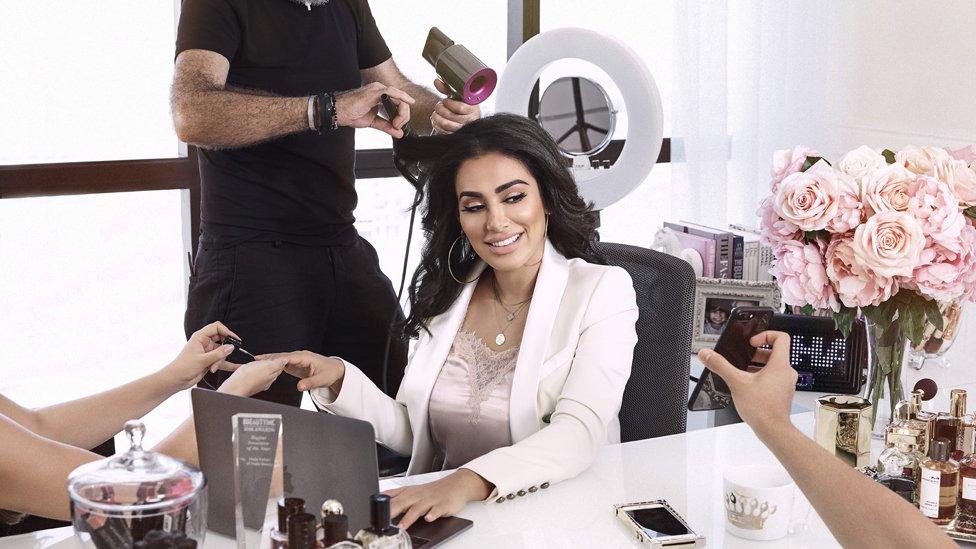
What's next for Huda Beauty?
There was always a plan for the company to go beyond lashes and for Huda to put her own stamp on the beauty world - by using her Iraqi heritage to create make-up with a Middle Eastern influence.
"We made the lip contour first, which is a lip liner, liquid lipstick and then the eyeshadow palette and the response was enormous," Huda says.
"Because I had grown up in the US, I had a very middle-eastern style, but also a very western influence as well - I always knew I wanted to be global.
"I grew up in the States in a very small town in the south, in Tennessee, and I didn't know why but I wore so much eyeliner - no one around me did, including my mother.
"I started to wonder when I left and moved to the Middle East whether, in fact, it was innate."
Allow Instagram content?
This article contains content provided by Instagram. We ask for your permission before anything is loaded, as they may be using cookies and other technologies. You may want to read Meta’s Instagram cookie policy, external and privacy policy, external before accepting. To view this content choose ‘accept and continue’.
Alison Tay is editor-in-chief of Grazia Middle East and says the rise of Huda Beauty has come at a time when Arab trends "have begun to gain global traction".
"An example of this is the modesty movement influencing the international catwalks," Tay tells the BBC.
She also refers to Huda's latest launch - a set of four perfumes that can be worn both separately and layered on top of each other.
"With her latest fragrances, Huda's giving the world a master class in scent-layering, a practice that is second nature in the Middle East."
'I'm not financially motivated'
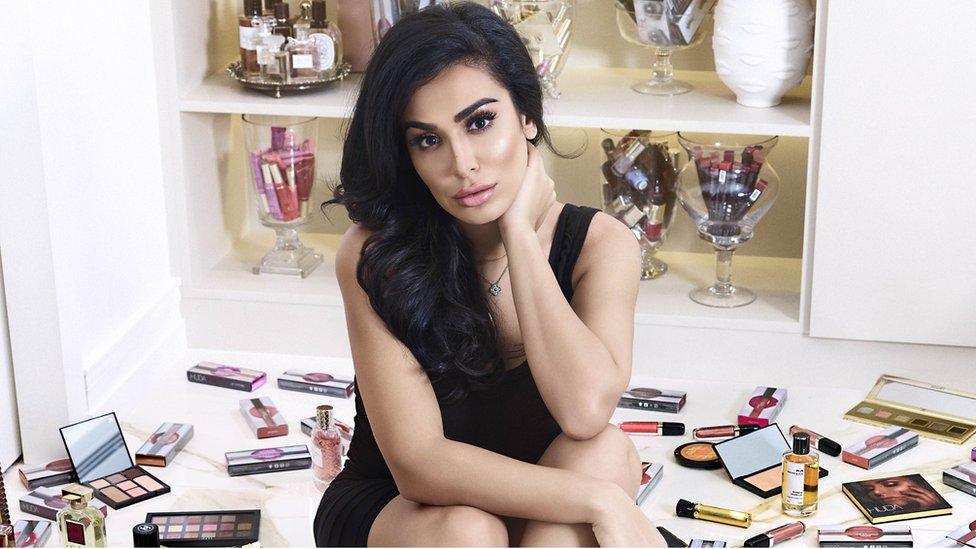
Huda Kattan launched Huda Beauty in 2013 and it is now said to be worth more than $1bn
Huda Beauty has grown extremely quickly, with the amount of products available now at over 140 - bringing in $200m (£158.7m) in annual sales, external.
But Kattan says profit is not part of her mission and she instead wants to focus on spreading her message.
"I'm not financially motivated," Huda says.
"I'm here for a purpose, I'm not here because I want to make a lot of money, I'm never like 'oh my god, this is going to make a lot of money, let's do this'.
"Recently I was offered over $10m to be an ambassador for some products and I didn't even think about it, I just refused.
"It's not because I don't love the products, but because I'm here on a mission, and ultimately that's to challenge the industry.
"I feel like for a long time brands created so many products and were just talking at people, selling them a distinct idea of what beauty is, boxing up beauty and giving it to every single person in the world."
Huda's offering is more inclusive, with products available for all skintones.
'Beauty has become really political'
Allow Instagram content?
This article contains content provided by Instagram. We ask for your permission before anything is loaded, as they may be using cookies and other technologies. You may want to read Meta’s Instagram cookie policy, external and privacy policy, external before accepting. To view this content choose ‘accept and continue’.
Alison Tay says that "Huda is the poster 'girl boss' for every girl with a social media account and a dream in the Middle East", highlighting how important having a woman of colour as a role model can be.
This is something Huda takes very seriously, explaining that her Iraqi heritage has motivated her to create new standards of beauty as a way of inspiring other "brown people", as she felt growing up that no beauty brands tried to appeal to her.
"I hated it as a child because I never fit those standards of what beauty was and I always loved individuality.
"Beauty has become really political in the last 18 months, brands need to become aware of why it's become political and if you ask me, it's because of oppression.
"We've got to be more outspoken and demanding, for me, as a new beauty brand, I think it's great."
The discussion moves on to Fenty Beauty - the make-up brand launched by Rihanna last September - which was praised for its inclusivity across all skin tones.
Allow Instagram content?
This article contains content provided by Instagram. We ask for your permission before anything is loaded, as they may be using cookies and other technologies. You may want to read Meta’s Instagram cookie policy, external and privacy policy, external before accepting. To view this content choose ‘accept and continue’.
"Part of the success of Fenty was the political movement," Huda explains.
"There was that heightened success that really created a movement in the media and people were so passionate about it.
"She's Barbadian, so as a woman of colour it was the first time to see somebody do that.
"The need for inclusivity comes from oppression, from people feeling like that they haven't been a part of things and that's me, too."

Follow us on Facebook, external, on Twitter @BBCNewsEnts, external, or on Instagram at bbcnewsents, external. If you have a story suggestion email entertainment.news@bbc.co.uk, external.
- Published30 June 2017
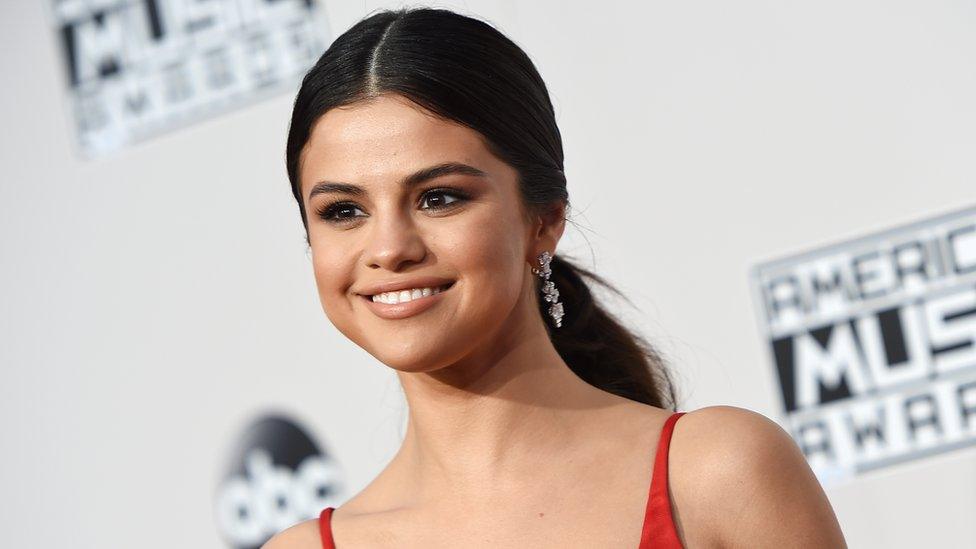
- Published13 July 2018
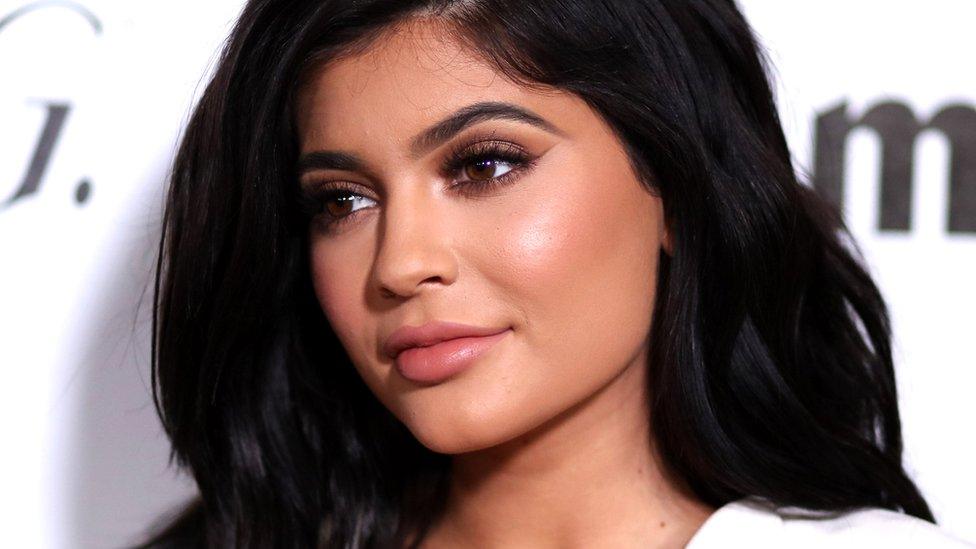
- Published26 November 2018
